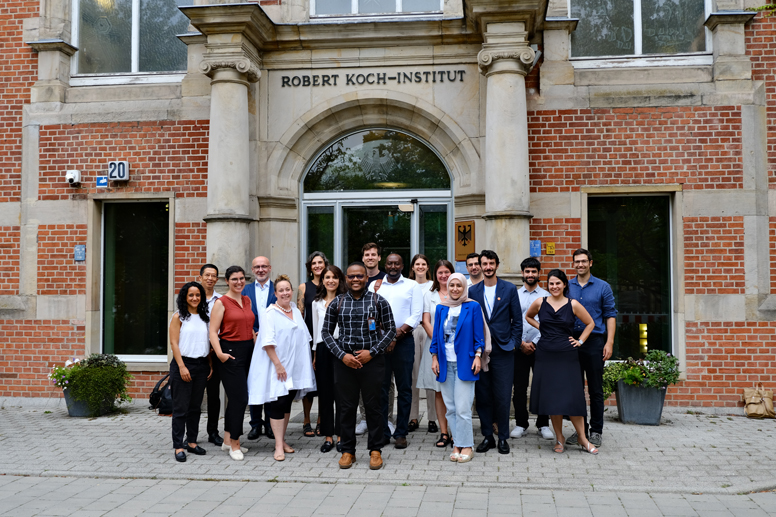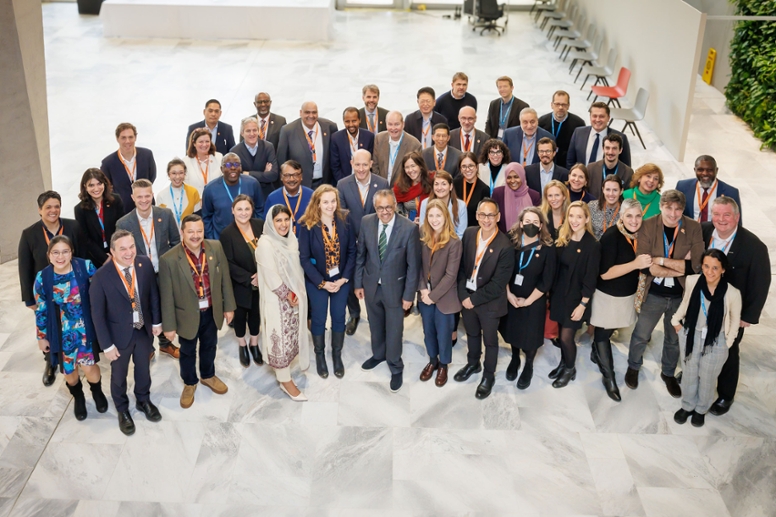Empowering the Next Generation of Global Health Experts: The GOARN Berlin Fellowship Program
Date: 11/03/2025
The Global Outbreak Alert and Response Network (GOARN), a key initiative by the World Health Organization (WHO), has long played a vital role in coordinating international efforts to respond to public health emergencies. The GOARN Berlin Fellowship Program, a cornerstone of this initiative, opens doors for emerging public health experts from GOARN partner institutions and networks to develop their expertise in epidemic intelligence, outbreak response, and global health security. In 2025, the program continues its mission by welcoming a new group of talented professionals who will contribute to enhancing outbreak preparedness and response in their respective countries.

Pic. 1: Opening Ceremony of GOARN Berlin Fellowship (Cohort 2) in Berlin, August 2024
The Global Outbreak Alert and Response Network (GOARN), a key initiative by the World Health Organization (WHO), has long played a vital role in coordinating international efforts to respond to public health emergencies. The GOARN Berlin Fellowship Program, a cornerstone of this initiative, opens doors for emerging public health experts from GOARN partner institutions and networks to develop their expertise in epidemic intelligence, outbreak response, and global health security. In 2025, the program continues its mission by welcoming a new group of talented professionals who will contribute to enhancing outbreak preparedness and response in their respective countries.
The GOARN Berlin Fellowship Program is a collaborative project coordinated by the WHO Hub for Pandemic and Epidemic Intelligence (WHO Hub), the Robert Koch Institute (RKI) and GOARN Operational Support Team. This provides an excellent environment to further develop their project by having access to global health research and expertise, providing fellows with unparalleled opportunities to collaborate on high-impact projects. Fellows gain hands-on experience and contribute to innovative work in public health surveillance, epidemic control, and preparedness strategies.
"The GOARN Berlin Fellowship Program plays an essential role in strengthening capacities of GOARN Partner institutions. Through access to know-how and infrastructure, fellows further develop their projects. Their innovative projects will strengthen epidemic intelligence and outbreak response capacities in fellows’ institutions and will contribute to enhancing global health security. Through partnerships with the WHO Hub for Pandemic and Epidemic Intelligence, Robert Koch Institute, and national health agencies, we are strengthening the collective ability to respond effectively to health emergencies." Armand Bejtullahu, GOARN Manager a.i.
To date, the program has successfully completed its first two cohorts, with four participants from Nigeria, Pakistan, Lebanon, and South Africa. Cohort 1 and cohort 2 brought together talented professionals, each contributing unique perspectives and innovative solutions to enhance public health preparedness in their respective regions.

Pic. 2: GOARN Steering Committee Meeting (SCOM) in Geneva, December 2023
During their six-month fellowship based in Berlin, the fellows worked on a range of impactful projects. Their projects focused on implementing event-based surveillance systems to provide early warnings for infectious disease outbreaks, enhancing epidemic intelligence for rabies surveillance to strengthen preparedness for zoonotic diseases, and building epidemic intelligence capacity to improve cholera outbreak responses. In addition to improving public health surveillance data sharing by enhancing One Health content in training curricula. These projects highlight the importance of partnerships in advancing global health preparedness and response, providing fellows with valuable opportunities for hands-on experience, information sharing, and knowledge exchange. Through collaboration with experts from the WHO Pandemic Hub and RKI, fellows contributed to high-impact projects, gaining valuable experience they will leverage to strengthen their home institutions and enhance global health response efforts. Reflecting on the significance of these partnership, Dr. Basel Karo, Co-Director of WHO Collaborating Centre for GOARN, Robert Koch Institute (RKI), emphasized:
"At the Robert Koch Institute, we are committed to enhancing global pandemic preparedness and response efforts. The GOARN Berlin Fellowship Program provides a platform for collaboration with emerging experts worldwide to address the evolving challenges of global health security. These partnerships are essential for fostering international cooperation, expanding professional networks, and building resilient health systems capable of effectively managing future outbreaks."
Looking Ahead
The GOARN Fellowship Program is a cornerstone of GOARN’s mission, equipping emerging experts with essential knowledge and hands-on experience. By collaborating with experts from the WHO Hub and the RKI, fellows deepen their expertise in epidemic intelligence and response. As expressed by Geoffrey Namara, Country Support Officer, WHO Hub for Pandemic and Epidemic Intelligence
"The WHO Hub for Pandemic and Epidemic Intelligence is committed to supporting member states in strengthening collaborative surveillance through the use of data for early detection, analyses and decision making to control outbreaks. By fostering collaboration with talented professionals in the GOARN Berlin Fellowship Program, we aim to develop robust, data-driven health systems that can quickly and effectively respond to the next public health emergency."
This experience empowers participants with the tools to strengthen health systems and enhance emergency preparedness in their home countries. Through their work, fellows contribute to more resilient global health systems, improving response capabilities and reducing the impact of future outbreaks and pandemics.
Global Outbreak Alert and Response Network (GOARN)
The Global Outbreak Alert and Response Network (GOARN) is a collaborative initiative coordinated by the World Health Organization (WHO) that aims to strengthen global health security by providing rapid, coordinated responses to public health emergencies.

Pic. 3: Fellows participating in the GOARN Tier 1.5 Orientation for International Outbreak Response Training in Berlin, October 2023
Currently, the network includes over 310 institutions, encompassing national public health agencies, other government institutions, non-governmental organizations, and other technical organizations. GOARN’s focus is on enhancing country-level operations and strengthening regional development, governance, and partner involvement in key areas such as alert and risk assessment, rapid response, training, and research. By bringing together a wealth of expertise and resources, GOARN ensures that countries facing outbreaks can access timely support, data, and guidance to effectively contain and mitigate the spread of disease.
Through its efforts, GOARN plays a critical role in improving global health preparedness and response, ensuring that the international community is better equipped to tackle the challenges posed by pandemics and epidemics.
Robert Koch Institute (RKI)
The Robert Koch Institute (RKI) is a leading institution in Germany dedicated to public health research, infectious diseases, and epidemiology. Through the fellowship program, fellows collaborate with RKI experts, gaining access to crucial epidemiological data and scientific insights. These collaborations support the development of evidence-based strategies to mitigate the impact of future pandemics and epidemics, helping fellows become experts in the field of global health security. Since 2019, WHO has designated the Information Centre for International Health Protection (INIG/ZIG 1) at the Robert Koch Institute (RKI) as a WHO Collaborating Centre for GOARN.
WHO Hub for Pandemic and Epidemic Intelligence
The WHO Hub for Pandemic and Epidemic Intelligence, based in Berlin, focuses on improving global health systems by enhancing data collection, analysis, and intelligence sharing. Its aim is to strengthen the world’s ability to respond effectively to health emergencies by providing real-time insights and advanced analytics. Fellows participate in this cutting-edge work, contributing to the development of more robust, data-driven global health systems.
